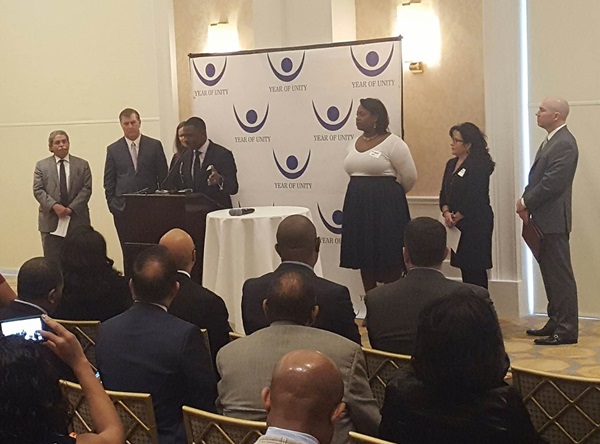The Friday night march in downtown Dallas on July 7, 2016, was a peaceful protest, but a lone gunman, unconnected to the protesters, changed that. He killed five white Dallas police officers and wounded nine other officers and two civilians.
The Rev. Richie Butler, pastor of St. Paul United Methodist Church in downtown Dallas, remembers the horror of the evening.
"We immediately had a prayer service in Thanksgiving Square and reached out to people who would never have connected," he said. "Tragedy often helps us realize what unites us is greater that what divides us."
Following that event, Butler, an African-American, decided he had to do more. His first call was to a fellow Dallas pastor, a white man. Butler asked him and his church to join Butler's church for a night of prayer.
{full_page_ad}
Butler said his calling a white pastor was important "I knew we had to do something positive to show our churches and the city we are all in this together."
With the positive outcome of the prayer event, Butler saw the need to reach beyond the churches. He established a new organization YOU (Year of Unity) to help Dallas heal.
In a fortuitous string of events, Butler ran into Dallas Mayor Mike Rawlings in an American Airlines Admirals Club.
"I just told him I had an idea and needed his support," Butler said. "He was all for it. He told me if I would be in charge, he was on board." Among others serving with Rawlings on the YOU board, the most well-known is former President George W. Bush, honorary co-chair.
Butler became acquainted with Bush while serving with Laura Bush on a board at Southern Methodist University. "It was just a matter of asking him if he would serve," Butler said. "He loves Dallas and was glad to help."
Other business, church and community leaders from the city signed on and work began.
"We asked these other leaders to reach out and turn the moment into a movement," Butler continued. "It took a few months of organizing and vision casting to really develop and focus the organization. I thought it was crucial that we emphasize healing will begin when we work together. I constantly say, ‘What unites us is greater than what divides us.' The enemy wants us to hold on to the divisions."
The tagline ‘Together We ...' came from that thinking.
YOU has Together We Dine where people share a meal and conversation in various churches and other venues. Butler said Together We Dine has been especially effective. People who had never been together have met and shared a meal. "Some very real dialogue has come from this," he said.
Together We Worship gives congregations the opportunity to have a pastor exchange, where clergy from various denominations stepped into pulpits other than their own. About 30 churches participated. Butler said that was not only eye opening, but fun for the pastors and the congregations.
Together We Do Sports offered members of the Dallas Police Department and youth in the city the opportunity to get together for sport activities such as baseball and basketball. "We see this as a way of interacting with each other in a safe environment and letting relationships begin to take place," Butler said.
Together We Learn is a time of education and dialogue between police and youth. Butler said this involves a classroom component and a simulation component where the youth actually participate in a simulation of being pulled over by the police and learn what to expect and how to react. "This promotes a lot of understanding," he said.
Together We Do Arts is coming. Butler said it would bring the Dallas art community to work with city residents on a large mural in the downtown area.
A citywide Together We Heal event was scheduled for June 15 at the American Airlines Center. Butler said it would be a non-confrontational event drawing all the city's people together.
YOU is planning a citywide Together We Sing event for 2018.
Butler is quick to praise the St. Paul church members for their tremendous support.
"This could not have happened without them," he said. "They are 100 percent behind the vision. They have been some of the strongest supporters and most faithful volunteers at the events. When I came to the church as pastor, I made it clear that I believe God has sent us to shepherd the city. I think our downtown location is crucial. We understand our role as a leader in community events. We host events and partner in many of them."
Butler has seen a lot of conflict within the diversity of Dallas, but said he is incredibly hopeful about the message of YOU.
"We want to transfer from the Year of Unity to the City of Unity," he said. "I believe we can take this model and help other communities do their own year of unity. I believe this could be part of the work of The UMC because we are in every community in the country. There are Republicans and Democrats, rural and urban, black and white and brown. I believe the church is the vehicle that can unite us. Jesus can cross all those lines."
Butler said, "YOU is not necessarily for my generation or my parents' generation. It is a blueprint for my children's generation.
"I'm in my 40s and probably more progressive than most, but we all have our prejudices and hang-ups," he said. "I don't see the same prejudice and suspicion in young people today. My daughter's ‘Sweet 16' party looked like the United Nations. We had every color and nationality there. She is a very proud African-American young lady, but she has a wide circle of friends and relationships with people from other races and ethnicities. That's a great sign of hope."
Polly House is editorial assistant for Interpreter and Interpreter OnLine. She is based in Nashville, Tennessee.

